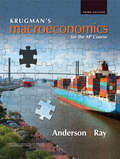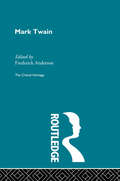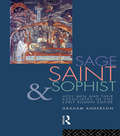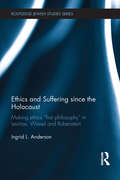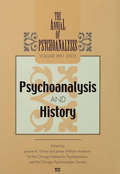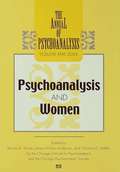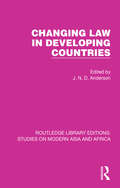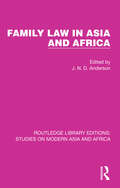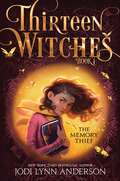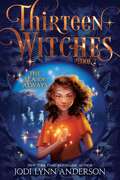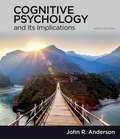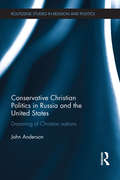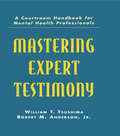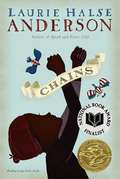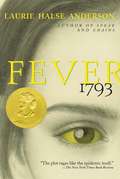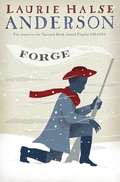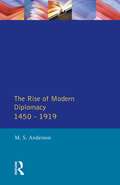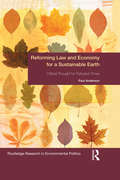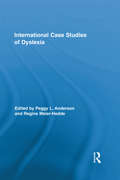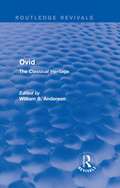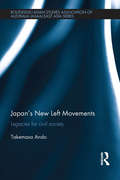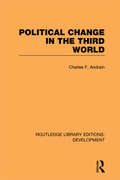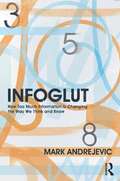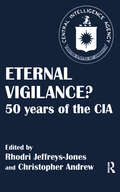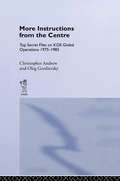Special Collections
Benetech’s Global Certified Accessible Titles
Description: Benetech’s GCA program is the first independent third-party EPUB certification to verify ebook accessibility. By creating content that is born accessible, publishers can meet the needs of all readers. Learn more: https://bornaccessible.benetech.org/
- Table View
- List View
Krugman’s Macroeconomics for the AP® Course [Student Edition]
by David Anderson and Margaret RayAP® Macroeconomics is hard. Krugman’s Macroeconomics for the AP® Course, third edition was created to help you solve the economics puzzle. Assembled by AP® experts and divided into short modules, the organization, language, and emphasis perfectly mirrors College Board’s curriculum framework. This dedication to the AP® courses keeps students and teachers on track to realize success on the AP® exam.
Mark Twain
by Frederick AndersonThis set comprises 40 volumes covering 19th and 20th century European and American authors. These volumes will be available as a complete set, mini boxed sets (by theme) or as individual volumes. This second set compliments the first 68 volume set of Critical Heritage published by Routledge in October 1995.
Sage, Saint and Sophist
by Graham AndersonHoly men, both pagan and Christian are persistent and puzzling figures in the religious life of the Roman Empire. In this first historical study of Holy Men for more than half a century, Dr Anderson applies techniques of literary analysis to throw light on the lifestyles and behaviour of these figures, from Jesus Christ to Peregrinus Proteus to dio Chrysostom, stressing their individuality as much as their common features.Sage, Saint and Sophist examines the variety of services, real or imaginary, that these colouful figures had to offer and how they maintained their credibility to become the objects of successful religious cults.
Ethics and Suffering since the Holocaust
by Ingrid L AndersonFor many, the Holocaust made thinking about ethics in traditional ways impossible. It called into question the predominance of speculative ontology in Western thought, and left many arguing that Western political, cultural and philosophical inattention to universal ethics were both a cause and an effect of European civilization's collapse in the twentieth century. Emmanuel Levinas, Elie Wiesel and Richard Rubenstein respond to this problem by insisting that ethics must be Western thought's first concern. Unlike previous thinkers, they locate humanity's source of universal ethical obligation in the temporal world of experience, where human suffering, rather than metaphysics, provides the ground for ethical engagement. All three thinkers contend that Judaism’s key lesson is that our fellow human is our responsibility, and use Judaism to develop a contemporary ethics that could operate with or without God. Ethics and Suffering since the Holocaust explores selected works of Levinas, Wiesel, and Rubenstein for practical applications of their ethics, analyzing the role of suffering and examining the use each thinker makes of Jewish sources and the advantages and disadvantages of this use. Finally, it suggests how the work of Jewish thinkers living in the wake of the Holocaust can be of unique value to those interested in the problem of ethics in the twentieth and twenty-first centuries. Presenting a thorough investigation of the work of Levinas, Wiesel and Rubinstein, this book is of key interest to students and scholars of Jewish studies, as well as Jewish ethics and philosophy.
The Annual of Psychoanalysis, V. 31
by Jerome A. Winer and James William AndersonIn 1958 William L. Langer, in a well-known presidential address to the American Historical Association, declared the informed use of psychoanalytic depth psychology as "the next assignment" for professional historians. Psychoanalysis and History, volume 31 of The Annual of Psychoanalysis, examines the degree to which Langer's directive has been realized in the intervening 45 years. Section I makes the case for psychobiography in the lives of historical figures and exemplifies this perspective with analytically informed studies of the art of Wassily Kandinsky; the films of Stanley Kubrick; and the anti-Semitism of Adolf Hitler. Section II reviews Freud's own psychohistorical contributions and then considers the relevance to historical inquiry of the more recent perspectives of Winnicott, Kernberg, and Kohut. Section III explores an intriguing tributary of psychobiographical inquiry: the impact of the biographer's own subjectivity on his or her work. Section IV turns to a topic of perennial interest: the psychobiographical study of American presidents. Section V turns to the special challenges of applying psychoanalysis to topics of religious history and includes topical studies of religious figures as disparate as the 15th century Asian Drukpa Kunley and Osama bin Laden. Section VI focuses on the recent extension of psychohistorical inquiry to groups of people and to cultural phenomena more generally: an investigation of the youth movement in pre-Nazi Germany; consideration of how societies, no less than individuals, reenact and work through traumas over time; and an outline of the role of analysis in constructing a depth-psychological "social psychology" of use to historians. These papers, no less than those that precede them, are compelling testimony to the claim with which editors James William Anderson and Jerome A. Winer begin the volume, to wit, that "Psychoanalysis would seem to be a resource indispensable to the study of history."
The Annual of Psychoanalysis, V. 32
by Christine C. Kieffer and Jerome A. Winer and James William AndersonPsychoanalysis and Women, Volume 32 of The Annual of Psychoanalysis, is a stunning reprise on theoretical, developmental, and clinical issues that have engaged analysts from Freud on. It begins with clinical contributions by Joyce McDougall and Lynne Layton, two theorists at the forefront of clinical work with women; Jessica Benjamin, Julia Kristeva, and Ethel Spector Person, from their respective vantage points, all engage the issue of passivity, which Freud tended to equate with femininity. Employing a self-psychological framework, Christine Kieffer returns to the Oedipus complex and sheds new light on the typically Pyrrhic oedipal victory of little girls. Section III broadens the historical context of contemporary theorizing about women by offering the personal reminiscences of Nancy Chodorow, Carol Gilligan, Brenda Solomon, and Malkah Notman. A final section, dedicated to "women who shared psychoanalysis," features historical essays on Ida Bauer (Freud's "Dora"), Anna Freud, Dorothy Burlingham, Edith Jacobson, and Therese Benedek, along with Linda Hopkins's revealing interview of Marion Milner. Of special note is Marian Tolpin's examination of three women - Bauer, Helene Deutch, and Anna Freud - who helped shape Freud's notion of the "femail castration complex," and Elisabeth Young-Bruehl's exploration of how two women - Anna Freud and Dorothy Burlingham - developed parent-infant observation. Psychoanalysis and Women is an extraordinary chronicle of the distance traveled since Freud characterized women's sexual life as "the dark continent." The contributors vitalize a half century of theory with the lessons of biography, and they broaden clinical sensibilities by drawing on recent developmental, gender-related, and socio-psychological research. In doing so, they attest to the ongoing reconfiguration of Freud's dark continent and show the psychoanalytic psychology of women to be very much a revolution in progress.
Changing Law in Developing Countries
by J. N. D. AndersonThe 1960s, in retrospect, may be chiefly remembered for the unprecedented constitutional developments it witnessed in countries emerging from colonial rule. Originally published in 1963, an examination of these constitutional developments from the authoritative pens of the previous Legal Adviser to the Colonial and Commonwealth Relations Offices, and the Legal Adviser to the Colonial Office at the time was, therefore, particularly timely – for no two men in human history can have had to draft so many constitutional instruments. One after another of these new constitutions had, moreover, included certain ‘Fundamental Rights’, so a discussion of this subject by a recognised academic authority, together with an examination by an ex-Chief Justice of Allahabad of the constitutional writs which have been so widely used in India to protect these rights, was particularly appropriate. An erudite examination of the origins of the famous phrase ‘Justice, Equity and Good Conscience’ by the Reader in Oriental Laws in the University of London, fittingly concludes the first half of this volume. Legal developments in these emergent countries, had, however, by no means been limited to the sphere of constitutional law. So the series continues with contributions on the legal profession in African territories, by a former President of the Law Society, and on the problems posed by Islamic law in that continent, by the Professor of Oriental Laws. Criminal Law is represented by a consideration of ‘Liability under the Nigerian Criminal Code’ by an ex-Chief Justice of the Western Region; matters economic and sociological by papers on ‘Legal Development and Economic Growth in Africa’ and ‘Women’s Status and Law Reform’ by two experts in Africa law; and developments in Asia by an examination of recent legislation on family law in Pakistan, and of the sources of Chinese Law in Hong Kong, by other members of the staff of the School of Oriental and African Studies.
Family Law in Asia and Africa
by J. N. D. AndersonOriginally published in 1968, we were witnessing a new – and welcome – emphasis on Comparative Law, both in the Universities and even the practising profession, together with a quickened interest in the law of family relations. This volume provided a wealth of information for anyone wishing to study these relations in a widely comparative context. The chapters cover not only the basic law of marriage and divorce in a number of developing countries both in Asia and Africa, but also discuss in considerable detail the ways in which matrimonial property is regulated under different systems. This was a highly topical subject at the time, when our own law of matrimonial property was under criticism and active reconsideration. The book also treats such subjects as the eclipse of the patriarchal family in contemporary Islamic law, religious law and the modern family in Israel, the juristic basis and context of Parsi family law, and contemporary family law in Southern Africa.
The Memory Thief
by Jodi Lynn Anderson&“This expertly crafted story thrums with magic, love, and tense action.&” —Booklist (starred review) Perfect for fans of The Girl Who Drank the Moon, this fantastical and heartfelt first book in a new trilogy from critically acclaimed and New York Times bestselling author Jodi Lynn Anderson follows a girl who must defeat thirteen evil witches.Twelve-year-old Rosie Oaks&’s mom is missing whatever it is that makes mothers love their daughters. All her life, Rosie has known this...and turned to stories for comfort. Then, on the night Rosie decides to throw her stories away forever, an invisible ally helps her discover the Witch Hunter&’s Guide to the Universe, a book that claims that all of the evil in the world stems from thirteen witches who are unseen...but also unstoppable. One of these witches—the Memory Thief—holds an insidious power to steal our most precious treasures: our memories. And it is this witch who has cursed Rosie&’s mother. In her quest to save her mom—and with her wild, loyal friend &“Germ&” by her side—Rosie will find the layers hidden under the reality she only thought she knew: where ghosts linger as shades of the past, where clouds witness the world, and a ladder dangles from the moon leading to something bigger and more. Here, words are weapons against the darkness, and witch hunters are those brave enough to wield their imaginations in the face of the unthinkable. The knowledge of her beloved stories is an arsenal in this world, but to unlock their power, Rosie must dare to have hope and believe in herself in the face of daunting odds.
The Sea of Always
by Jodi Lynn AndersonPerfect for fans of Newbery winner The Girl Who Drank the Moon, the adventurous and utterly relatable second book in the haunting and magical Thirteen Witches series from New York Times bestselling author Jodi Lynn Anderson follows Rosie as she hunts the remaining witches.After twelve-year-old Rosie Oaks&’s triumph over a powerful evil witch, a whole new world opened up to her—one full of witches who control many of the experiences that make life worth living and use their dominion to torment people. As the latest in a line of powerful witch hunters, it&’s up to Rosie to defeat them. With her loyal friend Germ by her side and her newly created witch-weapon at the ready, Rosie leaves home on a quest to find and vanquish the remaining of the original Thirteen Witches. With the help of an enchanted time-traveling whale, Rosie travels through the depths of the sea and across vast distances as she seeks to fulfill her destiny. The lives of those she loves hang in the balance and her skills are put to the ultimate test as Rosie digs deep for the strength to complete her quest. But can one girl hope truly hope to eliminate forces that have been at work for centuries?
Cognitive Psychology and Its Implications
by John AndersonCognitive Psychology 9th edition takes students to the forefront of the field and introduces them to key discoveries of cognitive psychology. With accessible and clear explanations, Anderson shows students how mental processes are investigated and how we know what we know about the mind. Cognitive Psychology 9e introduces students to both the cutting edge findings of cognitive neuroscience and classic behavioral studies. Experimental data, sample stimuli, brain images, and research tasks woven throughout the text give students a real understanding of how research is conducted and the excitement of discovery. Fascinating examples and applications of cognitive theory further keep students engaged.
Conservative Christian Politics in Russia and the United States
by John AndersonThis book explores the politics of conservative Christian churches and social movements in Russia and the United States, focusing on their similar concerns but very different modes of political engagement. Whilst secularisation continues to chip away at religious adherence and practice in Europe, religion is often, quite rightly, seen as an influential force in the politics of the United States, and, more questionably, as a significant influence in contemporary Russia. This book looks at the broad social movement making up the US Christian Right and the profoundly hierarchical leadership of the Russian Orthodox Church as socially conservative actors, and some of the ways they have engaged in contemporary politics. Both are seeking to halt the perceived drift towards a more secular political order; both face significant challenges in handling the consequences of secularism, pluralism and liberal individualism; and both believe that their nations can only be great if they remain true to their religious heritage. In exploring their experience, the book focuses on shared and different elements in their diagnosis of what is wrong with their societies and how this affects their policy intervention over issues such as religious and ethnic belonging, sexual orientation and education. Drawing on political, sociological and religious studies, this work will be a useful reference for students and scholars of religion and politics, Russian politics and American politics.
Mastering Expert Testimony
by Robert M. Anderson and William T. Tsushima and Robert M. Anderson, Jr.The past two decades have seen a rapidly growing involvement of psychologists and psychiatrists in legal proceedings for criminal cases, divorces, and traffic and industrial accidents. Mental health professionals are traditionally not trained to cope with the legal responsibilities that arise from their routine clinical work and are eager to learn the professional skills that are needed in forensic settings. There is presently no book which focuses entirely on the strategies and verbal tactics employed by attorneys who critically examine and challenge the testimony of mental health professionals. If psychologists and psychiatrists can familiarize themselves with the kind of questions and verbal exchanges that take place in the courtroom, they would be better prepared to provide their expertise in an effective manner. This book fills that need. Designed as a practical handbook to assist practitioners from all mental health disciplines, it focuses on typical courtroom dialogue between attorneys and mental health professionals who testify regarding their psychotherapy clients and also those who are hired by attorneys specifically to provide expert opinions. The authors, who have extensive experience in the courtroom, offer well-thought-out, effective responses as contrasted with impulsive and weak answers to attorneys' queries. Actual cases are employed to illustrate typical challenges in various legal areas, including criminal law, child custody hearings, and personal injury cases. Certain forensic issues such as the scientific bases of expert opinions, the accuracy of psychological vs. medical tests, and malingering, are emphasized throughout the chapters. The book is based on the belief that exposure to courtroom dialogue enhances the awareness of appropriate professional responses to an attorney's cross-examination and greatly alleviates fear toward a situation well-known to provoke intense levels of anxiety. Although it is written alluding to the forensic psychologist or psychiatrist, the strategies for the witness are readily applicable in most instances to all mental health professionals. Issues such as therapist bias, unconfirmed observations, and cultural and ethnic factors are clearly relevant to all who provide mental health services.
Chains
by Laurie Halse AndersonFrom acclaimed author Laurie Halse Anderson comes this compelling first novel in the historical middle grade The Seeds of America trilogy that shows the lengths we can go to cast off our chains, both physical and spiritual.As the Revolutionary War begins, thirteen-year-old Isabel wages her own fight...for freedom. Promised freedom upon the death of their owner, she and her sister, Ruth, in a cruel twist of fate become the property of a malicious New York City couple, the Locktons, who have no sympathy for the American Revolution and even less for Ruth and Isabel. When Isabel meets Curzon, a slave with ties to the Patriots, he encourages her to spy on her owners, who know details of British plans for invasion. She is reluctant at first, but when the unthinkable happens to Ruth, Isabel realizes her loyalty is available to the bidder who can provide her with freedom.
Fever 1793
by Laurie Halse AndersonIt's late summer 1793, and the streets of Philadelphia are abuzz with mosquitoes and rumors of fever. Down near the docks, many have taken ill, and the fatalities are mounting. Now they include Polly, the serving girl at the Cook Coffeehouse. But fourteen-year-old Mattie Cook doesn't get a moment to mourn the passing of her childhood playmate. New customers have overrun her family's coffee shop, located far from the mosquito-infested river, and Mattie's concerns of fever are all but overshadowed by dreams of growing her family's small business into a thriving enterprise. But when the fever begins to strike closer to home, Mattie's struggle to build a new life must give way to a new fight-the fight to stay alive.
Forge
by Laurie Halse Anderson&“One of the best novels they have ever read.&” —Kirkus Reviews Curzon navigates the dangers of being a runaway slave in this keenly felt second novel in in the historical middle grade The Seeds of America trilogy from acclaimed author Laurie Halse Anderson.Blistering winds. Bitter cold. And the hope of a new future. The Patriot Army was shaped and strengthened by the desperate circumstances of the Valley Forge winter. This is where Curzon the boy becomes Curzon the young man. In addition to the hardships of soldiering, he lives with the fear of discovery, for he is an escaped slave passing for free. And then there is Isabel, who is also at Valley Forge—against her will. She and Curzon have to sort out the tangled threads of their friendship while figuring out what stands between the two of them and true freedom.
The Rise of Modern Diplomacy 1450 - 1919
by M. S. AndersonThough international relations and the rise and fall of European states are widely studied, little is available to students and non-specialists on the origins, development and operation of the diplomatic system through which these relations were conducted and regulated. Similarly neglected are the larger ideas and aspirations of international diplomacy that gradually emerged from its immediate functions.This impressive survey, written by one of our most experienced international historians, and covering the 500 years in which European diplomacy was largely a world to itself, triumphantly fills that gap.
Reforming Law and Economy for a Sustainable Earth
by Paul AndersonFew concerns preoccupy contemporary progressive thought as much as the issue of how to achieve a sustainable human society. The problems impeding this goal include those of how to arrest induced global environmental change (GEC), persistent disagreements about the contribution of economic activities to GEC and further differences in views on how these activities can be reformed in order to reduce the rate of change and thus to mitigate threats to much life on Earth. Reforming Law and Economy for a Sustainable Earth aims to help resolve these problems in two ways. Since addressing GEC will require global coordination, the book first clarifies the conditions necessary to achieve this effectively. Paul Anderson explores these conditions with the aid of a sustained analysis of key concepts in influential disciplines, particularly in social and political theory and law, relating to the transition to a sustainable economy. Second, Anderson tackles the problem of how to arrest GEC by incisively evaluating two leading theoretical positions in terms of their capacity to support the conditions required for effective global coordination. From this basis, the book offers an extensive critique of the idea that global environmental problems can be solved within the framework of global capitalism. It also critically reviews and advances the proposition that global sustainability can be achieved only by changing the capitalist form of organizing the economy. Enriched by a genuinely interdisciplinary approach, the originality of Reforming Law and Economy for a Sustainable Earth lies in the manner it combines a rigorous analysis of the requirements for global sustainability with decisive conclusions as to what are, and what are not, viable means of fulfilling those requirements. The book advances research on sustainability within key disciplines, among them political theory, law and social science, by offering a timely and insightful statement about the global environmental predicament in the 21st century.
International Case Studies of Dyslexia
by Peggy L. Anderson and Regine Meier-HeddeDyslexia is a disability that exists in all countries that have high expectations for literacy. The inability to read in spite of normal intellectual potential represents one of the most puzzling educational challenges for literate societies, regardless of the culture or language. This book examines medical, psychological, educational, and sociological data from comprehensive case studies of preteen dyslexic children, in order to profile the disability as it occurs in seventeen different nations. Interviews with the children and their parents reveal how children with dyslexia are identified and treated around the world, and provide a look at various perceptions of dyslexia and its challenges. Researchers and practitioners in education, psychology, and health-related professions will find this case book to be an excellent reference. Parents of children with dyslexia will find the advocacy recommendations helpful.
Ovid
by William S. AndersonOvid: The Classical Heritage, first published in 1995, contains a diverse collection of reflections, ranging from the first century, through the Middle Ages, to the twentieth, on a poet who has been adored and reviled in equal measure. With the entire notion of ‘Western culture’ under duress, the need to establish continuity from antiquity to modernity is as pressing as ever. Each essay, selected by Professor Anderson, indicates an Ovidian theme or perspective which remains relevant to our self-understanding today. An enormous range of topics is investigated, in a variety of modes and styles: contemporary reaction, reception by Medieval Schoolmen, Ovid’s influence on Chaucer, and his importance for the ‘New Mythologists’. Overall, Ovid: The Classical Heritage offers a rich selection of essays, which cumulatively demonstrate the continuing importance and fascination of this great Roman poet.
Japan's New Left Movements
by Takemasa AndoThe Fukushima Daiichi nuclear accident that followed the March 2011 tsunami and earthquake in Japan shocked the world. In the wake the of the disaster, questions were asked as to why Japanese antinuclear movements were not able to prevent those with vested interests, such as businesses, bureaucrats, the media and academics, from facilitating nuclear energy policies? Taking this question as its starting point, this book looks more widely at the development and powerlessness of Japanese civil society, and seeks to untangle this intersection between social movements and civil society in postwar Japan. Central to this book are the Japanese New Left movements that emerged in the 1960s and 1970s, and the impact they have had on civil society and politics. By focusing on a key idea that a wide range of new leftists shared – the self-revolution in ‘everydayness’ – Takemasa Ando shows how these groups did not seek immediate change in the realms of politics and legislation, but rather, it was believed that personal transformation would lead to broader social and political change. By reconsidering the relationship between Japanese New Left movements of the 1960s and later social movements, this book crucially connects the constructive and disruptive legacies of the movements, and in doing so provides valuable insights into the powerlessness that plagues Japanese civil society today. Presenting a comprehensive picture of the New Left movements and their legacies in Japan, this book will be of great interest to students and scholars working in the fields of Japanese politics, Japanese history, and Japanese culture and society.
Poltiical Change in the Third World
by Charles AndrainIn this informative and highly readable book, first published in 1988, Charles Andrain explores the ways in which public policies and socio-political beliefs and structures cause political change in the Third World. The author examines 3 types of political change: (1) transitions in political leaders and their policies, (2) fundamental transformations in political structures, policy priorities, and political strategies for dealing with policy issues; and (3) the impact of economic, education, and health care policies on the society itself (including changes in unemployment, inflation, economic growth, literacy and birth and death rates). In the first part of the book, Professor Andrain presents a general overview of political change in the Third World, explaining how different models of political systems explain the dynamics of political events in Latin America, Asia, Africa and the Middle East. In the second part of the book, he then applies these models to specific changes in five developing nations: Vietnam, Cuba, Chile, Nigeria and Iran. The book is unique in its careful blending of a policy focus with a structural analysis of nation states, domestic social groups, and international institutions in the often turbulent regions of the developing world. It thus provides a very useful systematic approach to political developments in the Third World that will be welcomed by students, faculty and general readers.
Infoglut
by Mark AndrejevicToday, more mediated information is available to more people than at any other time in human history. New and revitalized sense-making strategies multiply in response to the challenges of "cutting through the clutter" of competing narratives and taming the avalanche of information. Data miners, "sentiment analysts," and decision markets offer to help bodies of data "speak for themselves"—making sense of their own patterns so we don’t have to. Neuromarketers and body language experts promise to peer behind people’s words to see what their brains are really thinking and feeling. New forms of information processing promise to displace the need for expertise and even comprehension—at least for those with access to the data. Infoglut explores the connections between these wide-ranging sense-making strategies for an era of information overload and "big data," and the new forms of control they enable. Andrejevic critiques the popular embrace of deconstructive debunkery, calling into question the post-truth, post-narrative, and post-comprehension politics it underwrites, and tracing a way beyond them.
Eternal Vigilance?
by Christopher Andrew and Rhodri Jeffreys-JonesEternal Vigilance? seeks to offer reinterpretations of some of the major established themes in CIA history such as its origins, foundations, its treatment of the Soviet threat, the Iranian revolution and the accountability of the agency. The book also opens new areas of research such as foreign liaison, relations with the scientific community, use of scientific and technical research and economic intelligence. The articles are both by well-known scholars in the field and young researchers at the beginning of their academic careers. Contributors come almost equally from both sides of the Atlantic. All draw, to varying degrees, on recently declassified documents and newly-available archives and, as the final chapter seeks to show, all point the way to future research.
More Instructions from the Centre
by Christopher Andrew and Oleg GordievskyDuring the decade that preceded Mr Gorbachev's era of glasnost and perestroika, the KGB headquarters in Moscow was putting out a constant stream of instructions to its Residencies abroad. Unknown to the KGB, however, many of these highly classified documents were being secretly copied by Oleg Gordievsky, at that time not only a high-ranking KGB officer based in London but also a long-serving undercover agent for the British. The selected documents in this volume, translated and analysed by the editors with a commentary by Christopher Andrew to set them in context, offer a revealing insight into the attitudes, prejudices and fears of the KGB during what were to prove its declining years.
